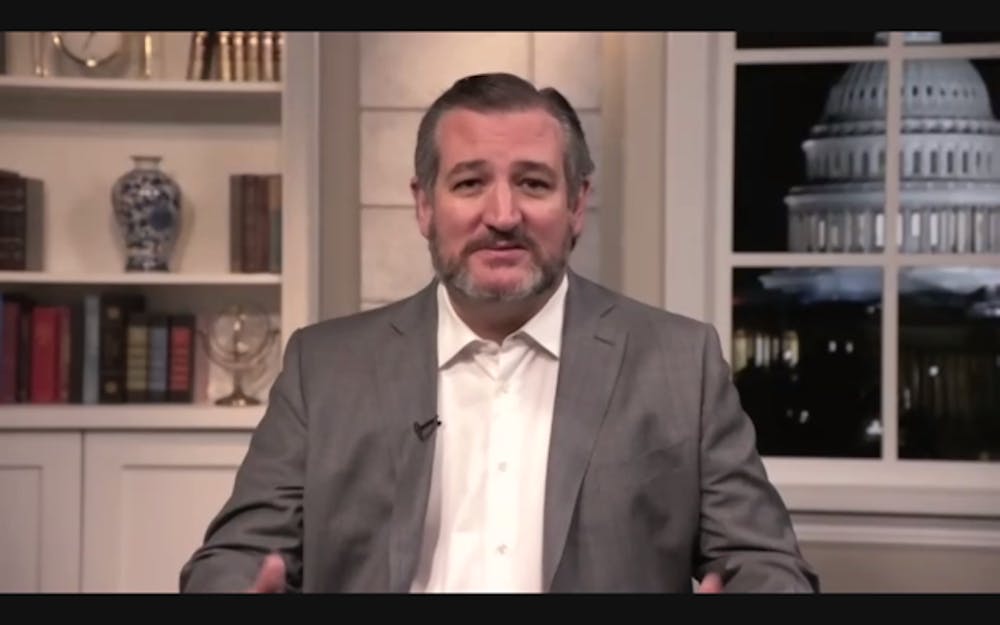In a wide-ranging discussion earlier this week, Senator Ted Cruz ’92 (R–TX) discussed the 2020 Presidential Election, free speech on college campuses, and his own memories of Princeton.
Afterwards, his remarks drew both praise and rebuke from listeners. While some students criticized what they felt were “softball” questions, various organizers and attendees who spoke to The Daily Princetonian said they enjoyed the event.
Over 200 students attended the Wednesday-night event, which was hosted by The Whig-Cliosophic Society, Princeton College Republicans, and The Princeton Tory, a right-leaning campus publication. It was organized and moderated by Adam Hoffman ’23, editor-in-chief of the Tory, president of the College Republicans, and a former intern for Cruz’s 2016 presidential campaign.
A prevailing topic of discussion was the state of free speech at Princeton and other college campuses.
“There was a sense that we could disagree without hating each other,” Cruz said of his time as an undergrad at Princeton. “I worry at college campuses that’s going away — that people are afraid to speak out.”
“When the left tries to silence dissenting views, we should recognize that is a statement of weakness,” Cruz continued. “The censors are the ones who don’t want to engage on the merits or substance.”
This was in response to Hoffman’s question of whether universities will “be a place for open discussion and a hub of debate, or re-education camps of the soft totalitarian left.” Hoffman prefaced this by claiming that classics professor Joshua Katz had been “canceled” by University administration after an op-ed regarding the Black Justice League, a Black student activist organization. He said that the University had shown in their response that “unpopular opinions are to be met with top-down consequences.”
While University President Christopher Eisgruber ’83 told the ‘Prince’ that he “personally and strongly” objected to Katz’s characterization of the Black Justice League as a “terrorist organization,” Katz was not disciplined by the University for his comments.

Characterizing the political left as “angry” and “shrill,” Cruz encouraged listeners to “defend free speech with a smile.”
Hearing the question’s framing and Cruz’s response, Texas resident Kesavan Srivilliputhur ’23 disagreed with Cruz and Hoffman’s assessment of the left.
“I voted for someone more liberal than Joe Biden [in the Democratic primary],” Srivilliputhur said. “But I’m still willing to come to the table to talk. A lot of liberals were at this event to watch and to learn. I think that’s something both Adam Hoffman and Ted Cruz ignored.”
Rebekah Adams ’21, a chemical and biological engineering concentrator who describes herself as “openly conservative,” found herself “reassured after the advice Ted Cruz shared.”

“I think he’s trying to say that you don’t have to feel embarrassed about sharing your [opinions] and to have a sense of conviction behind them,” she said.
Cruz’s discussion was bookended with reflections on the election. Asked about the Democratic party’s loss of House seats, Cruz felt the results showed a “repudiation of the agenda of the radical left, and an indication that this country is fundamentally a center right country.”
Later in the night, policy school concentrator Carson Maconga ’22 asked Cruz when and under what conditions should Republicans acknowledge publicly that Biden had won the presidential election. Cruz has been criticized referring to a Trump concession as “premature” well after all major media outlets had called the election in Biden’s favor.
Cruz answered by describing the moment he, as a 29-year old attorney working for the 2000 George W. Bush presidential campaign, had been the first to read and relay the implications of the Gore v. Bush Supreme Court decision to Bush’s Chief Legal Advisor James Baker, who then informed Bush of his win.
“The legal proceedings need to be over, there needs to be a clear, undisputed winner,” he said. “When the matter was decided, when the matter was concluded, that’s when [Bush] became president elect.”
“I think he didn’t want to answer the question so he started talking about Al Gore and Bush,” commented Emily Dale ’23, a sophomore majoring in computer science who attended the event.
“He does have a point in saying wait until the lawsuits are over, wait until you’re 100 percent confident. But [the 2020 election] is simply not the same as 500 votes in Florida,” Dale added. “It’s now multiple states that the legal challenge would have to win.”
Republicans, as of Nov. 19, have filed 30 legal challenges to contest the results of the election. Nineteen have been withdrawn, settled, dismissed, or denied.
In between discussion of the election, Matthew Wilson ’24, publicity chair of Whig-Clio and author for the Tory, felt that Cruz’s points on the “influence that the Chinese Communist Party had on American universities” stood out.
Cruz labeled this influence as from a “nation-state with billions or even trillions of dollars behind it engaged in the systematic effort to steal intellectual property, to steal technology, to engage in global espionage.”
“Many universities have been hopelessly naive,” Cruz summarized. “They’re not used to being targeted by a nation state for systematic infiltration and theft.”
One student, granted anonymity by The ‘Prince’, questioned the Senator’s characterization of espionage.
“I have a hard time believing the magnitude of the problem that Ted Cruz has said,” the student explained. “If it’s just based on specific examples or assumptions, I don’t think that Chinese students, especially if they’re the same Princeton students we are, should have no less of an equal access to education as we do.”
However, Wilson, who has written on the topic, felt Cruz’s framing of the issue was fair, noting that when “discussing China, you have to differentiate the Chinese people from the Chinese Communist government.”
“I think Senator Cruz did that quite well,” he said. “As a person of Chinese descent, I feel that’s very important.”
Cruz’s conversation was also punctuated with lighter moments.
Abraham Waserstein ’21, a Residential College Advisor in Butler College’s 1915 hall — where Cruz lived as an undergraduate — asked Cruz if he remembered his room number. Cruz did not, but promised to text his former roommate, David Panton ’92, and ask.
Jane Mentzinger ’22, president of the Princeton Debate Panel (PDP), asked Cruz what his favorite debate topic was and how his understanding of those topics changed. During his time at Princeton, Cruz was the education director of PDP and was ranked as the top speaker at the North American Debating Championship.
Cruz responded to the question by recounting his time in collegiate debate. Coming from a high school that didn’t offer debate, Cruz “spent the next four years virtually every single weekend debating, and loved it.”
Cruz then spent eight minutes breaking down the debate strategies he’d formulated with his debate partner, Panton — strategies which were “later applied to litigating in front of the Supreme Court and political arguments.”
Rebecca Han ’22, current treasurer of PDP, remarked that being able to “recognize his references was a very cool experience.”
“It was quite surreal to hear someone of his name recognition speak about these very mundane concepts — like a Prime Minister Rebuttal Speech or a Leader of Opposition Constructive Speech — that you imagine are limited to a quite niche college community,” she said.
Han is a senior news writer for the ‘Prince.’
Offering advice to conservative students who were eyeing a political career, Cruz stressed the importance of being truthful.
“We’ve all seen too many politicians that lie, that just tell us what we want to hear, and break their word. I wanted instead to be able to run on a record where if you wanted to know what I thought, you could point to the record,” he stated. He recommended that students “go build a record fighting for an issue that matters.”
When looking back on the night, Terrell Seabrooks ’21, vice president of Whig-Clio, noted that the attendees he’d spoken to “really enjoyed the discussion.”
“We want to be that political hub where regardless of your political views, you can come and hear what’s being said in Washington. So that’s why we’re really happy with tonight; we brought that conversation down to the student body,” he stated.
Srivilliputhur and Han agreed with Seabrooks’ sentiments about member reaction, but they also raised questions over the selection of pre-submitted audience questions by event organizers.
“They complained about censorship, how you can’t speak your mind anymore, but they picked pretty softball questions,” Texas resident Srivilliputhur said. “Both my roommate and I had questions about what Ted Cruz does for bi-partisanship … as someone represented by Cruz I’d like to have known his opinions on current events or specific policies.”
“It would have been interesting to hear him speak on COVID,” Han added.
Srivilliputhur, reflecting on the experience, noted that he “may disagree with Ted Cruz on a lot of issues.”
“But from a human to human standpoint, Princetonian to Princetonian,” he continued, “this event did a good job of humanizing Ted Cruz and showing that he’s just a guy like other people.”
Hoffman was unavailable for comment by the time of publication.
Editor’s Note: After publishing this piece, The Daily Princetonian granted one of the interviewed students anonymity, following personal concerns brought to our attention.








